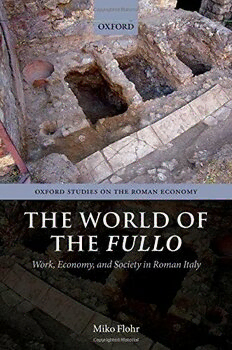
The world of the fullo : work, economy, and society in Roman Italy PDF
Preview The world of the fullo : work, economy, and society in Roman Italy
OXFORD STUDIES ON THE ROMAN ECONOMY GeneralEditors ALAN BOWMAN ANDREW WILSON OXFORD STUDIES ON THE ROMAN ECONOMY Thisinnovativemonographseriesreflectsavigorousrevivalofinterestinthe ancienteconomy,focusingontheMediterraneanworldunderRomanrule (c.100bctoad350).Carefullyquantifiedarchaeologicalanddocumentary datawillbeintegratedtohelpancienthistorians,economichistorians,and archaeologiststhinkabouteconomicbehaviourcollectivelyratherthanfrom separate perspectives. The volumes will include a substantial comparative elementandthusbeofinteresttohistoriansofotherperiodsandplaces. The World of the Fullo Work, Economy, and Society in Roman Italy MIKO FLOHR 1 3 GreatClarendonStreet,Oxford,OX26DP, UnitedKingdom OxfordUniversityPressisadepartmentoftheUniversityofOxford. ItfurtherstheUniversity’sobjectiveofexcellenceinresearch,scholarship, andeducationbypublishingworldwide.Oxfordisaregisteredtrademarkof OxfordUniversityPressintheUKandincertainothercountries #MikoFlohr2013 Themoralrightsoftheauthorhavebeenasserted FirstEditionpublishedin2013 Impression:1 Allrightsreserved.Nopartofthispublicationmaybereproduced,storedin aretrievalsystem,ortransmitted,inanyformorbyanymeans,withoutthe priorpermissioninwritingofOxfordUniversityPress,orasexpresslypermitted bylaw,bylicenceorundertermsagreedwiththeappropriatereprographics rightsorganization.Enquiriesconcerningreproductionoutsidethescopeofthe aboveshouldbesenttotheRightsDepartment,OxfordUniversityPress,atthe addressabove Youmustnotcirculatethisworkinanyotherform andyoumustimposethissameconditiononanyacquirer BritishLibraryCataloguinginPublicationData Dataavailable LibraryofCongressCataloginginPublicationData Dataavailable ISBN 978–0–19–965935–7 PrintedinGreatBritainby CPIGroup(UK)Ltd,Croydon,CR04YY Preface This monograph is not an attempt to write a definitive history of fulling in RomanItaly,nordoesitaimtoprovideacompleteanddetailedoverviewofall theevidenceavailable.Rather,theideabehindthisbookwastogivethetextual and material evidence for fulling from Roman Italy a clear place in the scholarly debate about the socioeconomic history of urban societies in the Romanworldandtouseittoaddsomenewperspectivestothehistoryofthe Italianpeninsulainthefirstcenturiesofourera,andtoaddtoourinsightinto everyday lives of people who did not belong to the elite circles that usually stand in the spotlight when scholars discuss the history of the Greek and Romanworld.Yet,theambitionwasmethodologicalaswellashistoriograph- ical: besides developing new ideas about certain aspects of ancient historical reality,theaimbehindtheprojectwasalsotodevelopnewwaysoflookingat certain types of evidence from Roman Italy and to come up with some new questions that might be used not only to interrogate the data discussed here, but subsequently may also be applied to other data sets. Whether or not this hasbeenausefulapproach,isnowforreaderstodecide. Writingthisbookhasbeenextremelyenjoyable.Tobeinapositionwhere youcanspendyourdaysdoingwhatyouliketodomostforseveralyearsisa privilegethatnoteverybodyisabletoenjoy,anditiscertainlynotnecessarily the case that such a privilege always falls to the people who most deserve it. Particularly if you are working on topics beyond the mainstream classical tradition,itisoftenamatterofgoodluck,perhapshelpedalongalittlebyhard work, creativity, and some basic skills. One of the things that too easily is forgottenisthatacademicselectionhasneverbeenandprobablyneverwillbe asimple‘survivalofthefittest’:withonlyafewplacesandtoomanytalented people,thereareelementsofluckandunfairnessinvolvedateachstageofthe academiccareer.Ihavebeenaveryluckypersonsofar. As I write this, it is almost exactly 10 years ago that I first started to think about the fullonicae of Pompeii and Ostia. A lot has happened since, and Iwouldnothavebeenabletoturnmyinitialthoughtsintothisbookwithout the help and criticism of many colleagues and friends, and without the generous gifts of some sponsors. First of all, I want to thank the Royal Dutch Institute in Rome for giving me two long-term research grants to prepare this project in 2002 and 2004, and for allowing me to use their accommodation and library in the following years. I also owe thanks to the PrinsBernhardCultuurfonds,whichtogetherwiththeFundatievandeVrijv- rouwe van Renswoude and Hendrik Muller’s Vaderlandsch Fonds funded a vi Preface nine-month research stay in Rome in 2005. Mrs. A.M. Kalmeier and the International Office of the Radboud University generously supported my fieldwork at Pompeii in 2007 and 2008. Further, Radboud University gave me,between2005and2010,theopportunitytospendfourandahalfyearsin Nijmegenworkingonthedissertationthatformsthebasisofthisbook.Here inOxford,inmycurrentpositionattheRomanEconomyProject,Ihavebeen abletofurtherdevelopandtestsomeoftheideasofmyoriginalthesis.Forthe kindpermissiontostudytheremainsoffullingworkshopsinthe field,Iowe sincerethanksto theSoprintendenzaArcheologicadiPompeiandtheSoprin- tendenza Archeologica di Ostia. Angela Caspio of the Soprintendenza Arche- ologicadiRomakindlyshowedmearoundthesiteoftheCasalBertonefullery inJuly2008. Several people have helped this book forward with their comments and feedback. Stephan Mols was closely involved from the very first stages on- wardsandprovidedvaluableadviceovertheyears.NathaliedeHaanandEric MoormannoversawthewritingprocesswhileIwasinNijmegenandoffered theiradviceandcriticismonbothstructureandcontents.Theyalsodidmuch more: without these three people, I would never have been able to become a scholar. Lian Verburg, Kirstin Min, Suzanne van de Liefvoort, Lily Weder- shoven,JetskeTinneveltandMandyvanderVeldenwerepartofthefieldwork team in Pompeii in 2006, 2007, and 2008, and have contributed greatly to theresultsoftheCleaningtheLaundriesproject,whicharepartofthisbook. I was also very lucky to be in touch with Tesse Stek, Jeremia Pelgrom, Eric Poehler, Kevin Cole, Nicolas Monteix, Nicolas Tran, Kerstin Droß-Krüpe, Steven Ellis, Wim Broeckaert, Cameron Hawkins, and many other scholars of my generation with whom I could discuss topics closely related to my own research in a friendly and supportive atmosphere. Crucially, Carol Van Driel-Murray, Gemma Jansen, Andrew Wilson, Olivier Hekster, Luuk deLigt,andJean-PierreBrunallreadearlierversionsofthetextandprovided useful comments and valuable criticism. Obviously, all remaining errors aremyown. Finally, writing a book is impossible without a significant amount of support in the private sphere. Friends and family see and hear parts of the processthatarelessvisibletotherestoftheworldandprovideindispensible moral support when needed. Unfortunately, the people closest to you suffer ratherthanprofitfromtheinvestmentintimeandenergyrelatedtowritingan academicmonograph.TherehavebeenmanytimesthatIhavenotbeenthere where I might have wanted or needed to be because I was abroad doing fieldwork or working in some library, or, worse, because I had emigrated. My parents know that all too well, but I hope they also know that they have been an enormous support, and that they, with all the social and liberal awareness they tried to give me, have, indirectly, contributed significantly to thefinalresult.However,mostofall,Iowethanks,apologies,andmanyother Preface vii thingstomywife,Lian,whonotonlyhadtobearwithmebeingabroadevery fewmonthswhilstwritingthisbook,butalsohadtodecidewhetherornotshe wantedtofollowmetotheUnitedKingdomin2010. Oxford 31March2012 This page intentionally left blank Contents ListofFigures xi ListofPlans xvii ListofAbbreviations xviii 1. Introduction 1 1.1. TheRomaneconomydebate 6 1.2. Fullonesandfullonicae:evidenceforfulling 12 1.3. Contextualizingthedata 35 1.4. Historyofresearch 43 2. Theeconomyoffulling 52 2.1. ThetextileeconomyofRomanItaly 53 2.2. Whoneedsthefullo?Understandingdemand 57 2.3. Approachingtheevidence 72 2.4. Ageographyofconsumption 84 2.5. Discussion 93 3. Therationalworkshop 96 3.1. Thefullingprocess 98 3.2. Investinginequipment 121 3.3. Organizingtheshopfloor 149 3.4. Runningtheworkshop 170 3.5. Discussion 179 4. Fullingandtheurbanenvironment 181 4.1. Theenvironmentaleffectsoffulling 184 4.2. Livingandworkinginafullonica 189 4.3. Fullingandpublicspace 211 4.4. Theurbangeographyoffulling 227 4.5. Discussion 239 5. Populatingthefullonica 242 5.1. Towardsasocialnetworkperspective 242 5.2. Socialinteractionontheshopfloor 246 5.3. Thesocialbasisofstaffnetworks 265 5.4. Differentiationandhierarchy 273 5.5. Discussion 286
